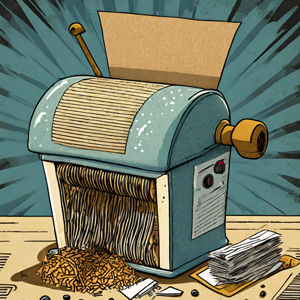
Let’s talk compost! We all know it’s good for the environment, creates nutrient-rich fertilizer for our gardens, and keeps food scraps out of landfills. But let’s be honest, sometimes that whole “composting takes forever” thing can be a bit discouraging. That’s where the speed composting cardboard Shredder comes in.
Well, fret no more, my fellow compost enthusiasts! Today, I’m here to share a secret weapon in the fight against sluggish decomposition: the humble shredder. You might be surprised at just how much this handy tool can supercharge your compost.
The Not-So-Secret Power of Surface Area
Composting is all about creating a happy home for millions of tiny decomposers – think bacteria, fungi, and other hardworking microbes. These little guys break down organic matter into nutrient-rich compost, but there’s a catch: the more surface area they have to munch on, the faster they can do their job.
Imagine this: you have a giant pile of whole apples versus a bowl of applesauce. Which do you think will be easier and faster to eat? The applesauce, of course! The same principle applies to composting. Large chunks of organic matter, like leftover veggie peels or eggshells, have a limited surface area for microbes to work with. This slows down the decomposition process.
Cardboard Shredder to the Rescue!
Here’s where our secret weapon comes in: cardboard! Cardboard is a fantastic source of brown material, which is essential for creating a balanced compost bin (think carbon to nitrogen ratio – we’ll get to that later). But the real magic happens when you take that cardboard and run it through a shredder.
Think about the last time you ordered something online. That massive cardboard box? Shredded up, it becomes a treasure trove of surface area for our decomposer friends. It’s like offering them a buffet instead of a single apple!
Now, there are a few things to consider when choosing a speed composting cardboard shredder. For smaller households, a manual shredder might be sufficient. It’s a good workout for the arms, and hey, bonus points for sustainability! However, if you’re dealing with a mountain of cardboard boxes, an electric shredder will save you some serious time and effort.
Shredding for Success: A Step-by-Step Guide
Alright, let’s get down to the nitty-gritty! Here’s how to use your trusty cardboard shredder to transform your compost bin into a black gold-making machine.
Gather your materials:
- Cardboard: Boxes, egg cartons, cereal boxes – anything cardboard goes (just avoid anything glossy or colored).
- Shredder: Manual or electric, whichever suits your needs!
- Compost bin: Choose a bin that allows for proper ventilation and moisture retention.
Shredding Tips:
Aim for a confetti-like consistency. This maximizes surface area while still allowing for proper air circulation within the compost bin.
Always feed the cardboard ridges perpendicular to the shredder blades to create air pockets.
Safety first! Always follow the manufacturer’s instructions when using a shredder. Keep your fingers and loose clothing away from the feeding slot.
Using Shredded Cardboard in Your Compost Bin:
Remember, a balanced compost bin needs both brown (carbon) and green (nitrogen) materials. That’s why shredded cardboard is such a great addition – it provides the much-needed carbon element. But don’t go overboard! Aim for a roughly 50/50 mix of shredded cardboard and green materials like kitchen scraps, grass clippings, and coffee grounds.
Benefits Beyond Speed
The benefits of using shredded cardboard go beyond just speeding up the decomposition process. Here’s what else you can expect:
- Improved aeration: Shredded cardboard allows for better air circulation within the compost bin, which is essential for healthy decomposer activity.
- Moisture retention: Cardboard acts like a sponge, helping your compost bin retain moisture without becoming waterlogged.
- Reduced odors: Slow decomposition can lead to unpleasant smells. By speeding up the process, shredded cardboard helps minimize odor issues.
Troubleshooting Speed Composting Cardboard Shredder
Now, let’s address some common concerns you might have:
- What if I use too much shredded cardboard? Too much of a good thing can be bad, even in composting. Stick to the 50/50 ratio of brown and green materials to avoid creating a carbon-rich bin that decomposes slowly.
- Will shredded cardboard attract pests? Not necessarily! A properly balanced compost bin with good moisture management shouldn’t attract pests. However, if you notice any unwanted visitors, it might be a sign that your compost bin is too dry or lacks nitrogen. Add more green materials and adjust moisture levels to create a less hospitable environment for pests.
Here are some other frequently asked questions about speed composting with a cardboard shredder:
- How long will it take for my compost to decompose using shredded cardboard? While results can vary depending on factors like climate and bin maintenance, you can expect to see noticeable decomposition within a few weeks compared to several months with larger chunks of organic matter.
- Can I compost shredded cardboard pizza boxes? Technically yes, but remove any greasy pizza remnants first, as these can attract pests and slow down decomposition.
- What other ways can I speed up my compost bin? Shredding other yard trimmings like leaves and twigs can also increase surface area and boost decomposition. Turning your compost bin regularly helps with aeration and moisture distribution.
Conclusion
So, there you have it! With the power of a cardboard shredder, you can unlock the secrets of surface area and transform your compost bin into a black gold factory. Remember, composting is a journey, and there will be some trial and error along the way. But with a little knowledge and the help of your trusty shredder, you’ll be well on your way to creating nutrient-rich compost that will nourish your garden and help you do your part for the environment.
Happy shredding and happy composting!
Websites like the United States Composting Council offer valuable information for beginner and experienced composters alike.
More Tools of the Trade
Composting Links:
United States Composting Council
EPA’s composting page
Cornell University Composting
The Compost Council